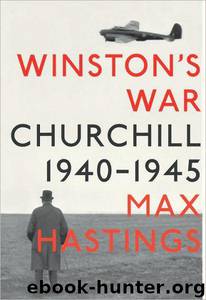Winston's War: Churchill, 1940-1945 by Max Hastings

Author:Max Hastings
Language: eng
Format: mobi, epub
ISBN: 9780307593122
Publisher: Knopf Doubleday Publishing Group
Published: 2009-06-03T04:00:00+00:00
Back in Cairo on August 17, Churchill briefly lapsed into exhaustion. After a rest, however, he quizzed Alexander about the prospective desert offensive, which there were hopes of launching in September. On the nineteenth, he drove 120 miles through sandy wastes landmarked with supply dumps and wired encampments to visit Montgomery at his headquarters and inspect troops. This was an outing which he thoroughly enjoyed. He claimed to detect a new mood among officers and men. His imagination surely ran ahead of reality, for the new regime had been in place only a week. But a perception of change buoyed his spirits. He slept in the plane back to Cairo, then attended a conference, dined and sat chatting to Brooke in the warm night air on the embassy lawn until two a.m. He commissioned the ambassador’s wife654, Lady Lampson, to undertake a shopping expedition on behalf of Clementine, buying Worth perfume, Innoxa and Chanel face cream, fifteen lipsticks—and silk to make the delicate underwear in which he loved to clothe himself.
A signal arrived from Mountbatten, describing the raid on Dieppe that had taken place that day. Of six thousand men engaged, mostly Canadian, a thousand had been killed and two thousand taken prisoner. More than a hundred aircraft had been lost in fierce air battles with the Luftwaffe. Yet the chief of Combined Operations reported, absurdly: “Morale of returning troops reported to be excellent. All I have seen are in great form.” It was some time before Churchill fully grasped the disastrous character of the raid. Lessons were learned about the difficulties of attacking a hostile shore. Inflated RAF claims masked the reality that the Germans had that day shot down two British aircraft for every one which they themselves lost. Once more, a sense of institutional incompetence overlay the debacle. The invaders bungled the amphibious assault in every possible way, while the Germans responded with their accustomed speed and efficiency. After almost three years of war, Britain was incapable of conducting a limited surprise attack against an objective and at a moment of its own choice. Mountbatten was successful in evading responsibility, much of which properly belonged to him—back in May, he had boasted to Molotov about “his” impending operation. But leaders and planners had failed at every level. Incredibly, Gen. Sir Archibald Nye, acting CIGS in Brooke’s absence, was unaware that the raid was taking place. It is scant wonder that Churchill lacked confidence in his commanders, and remained morbidly fearful that Britain’s war-making instruments were doomed to break in his hand.
Only Beaverbrook, still banging a drum for the Second Front, seemed unchastened by the experience of Dieppe. His Evening Standard asserted that the shipping problems impeding an early invasion could be overcome if the Chiefs of Staff displayed more guts, declared the raid to have been a near victory, and editorialised on August 21, 1942: “The Germans cannot afford any more Dieppes either on land or in the air … Two or three simultaneous raids on a large scale would be too much for the three solitary Panzer divisions in France.
Download
Winston's War: Churchill, 1940-1945 by Max Hastings.epub
This site does not store any files on its server. We only index and link to content provided by other sites. Please contact the content providers to delete copyright contents if any and email us, we'll remove relevant links or contents immediately.
| Africa | Asia |
| Canadian | Europe |
| Holocaust | Latin America |
| Middle East | United States |
Fanny Burney by Claire Harman(26602)
Empire of the Sikhs by Patwant Singh(23084)
Out of India by Michael Foss(16853)
Leonardo da Vinci by Walter Isaacson(13336)
Small Great Things by Jodi Picoult(7140)
The Six Wives Of Henry VIII (WOMEN IN HISTORY) by Fraser Antonia(5515)
The Wind in My Hair by Masih Alinejad(5095)
A Higher Loyalty: Truth, Lies, and Leadership by James Comey(4962)
The Crown by Robert Lacey(4814)
The Lonely City by Olivia Laing(4801)
Millionaire: The Philanderer, Gambler, and Duelist Who Invented Modern Finance by Janet Gleeson(4478)
The Iron Duke by The Iron Duke(4354)
Papillon (English) by Henri Charrière(4274)
Sticky Fingers by Joe Hagan(4198)
Joan of Arc by Mary Gordon(4110)
Alive: The Story of the Andes Survivors by Piers Paul Read(4031)
Stalin by Stephen Kotkin(3965)
Aleister Crowley: The Biography by Tobias Churton(3640)
Ants Among Elephants by Sujatha Gidla(3467)
